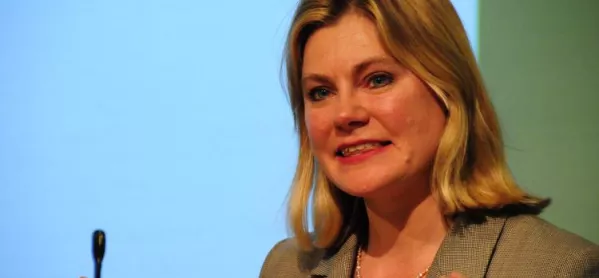I cannot help but feel a scintilla of optimism about what the future holds for education this week.
Okay, perhaps you couldn’t accuse of adopting a crazy, Monty Pythonesque “Always Look On The Bright Side Of Life” philosophy, but at least one major cloud has been lifted from the horizon: Theresa May has had to abandon her controversial plan to bring back grammar schools.
I know we should keep a close watch on this but the mood music about the proposal is that it is now way down the pecking order - and is probably dead.
In addition, free school meals for infants between the ages of four and seven will not be scrapped. Good thing, too, since millions of pounds had been spent on kitting out kitchens for them in the past few years.
I know we may have to do without the school breakfasts promised during the election campaign but - while the idea was nutritionally sound - it did seem to have been half-baked in its planning.
In addition, we have Justine Greening reinstated at the Department for Education. The consensus from those in the profession before the election was that - when she was not dodging giving support to the grammar school proposal or finding lukewarm words of praise for it - she displayed a keen grasp of her subject and was, in the words of several teachers’ leaders, “someone we can do business with”.
Of course, we cannot forget the other major dilemma facing schools at the moment - the impact of cuts in per pupil funding on them. Headteachers in 17 local authorities have combined together to warn they face imminent staff cuts and a reduction of subject choices for teenagers taking exams.
Conservatives can’t claim credibility on cash
The U-turn on scrapping school meals does mean, in terms of the Conservative manifesto, there is no extra cash around to offset the impact of the cuts.
However, I think sufficient note has been taken in government circles of the popularity of Labour’s election campaign on this issue to come up with something that will at least ameliorate their impact. On this point, though, I would ask the DfE to abandon its mantra about record levels of funding being poured into education.
It may be true there is more cash but nobody is convinced by it and it does not take into account rising pupil numbers, increases in staff and national insurance costs. It has about as much credibility as the phrase “strong and stable” government.
Of course, my mood of minimal optimism refers to this government and could easily be shattered by its collapse, with people being plunged into another election.
Time to go round to Brenda’s house in Bristol, methinks. She was the woman played again and again on TV who reacted to the last election by proclaiming loudly: “What? Another one?”
If the Conservative party gets its act together, unpalatable measures could be back on the table. On the other hand, there does seem to be a groundswell of support for Labour and, surely, Jeremy Corbyn’s party would reverse the impact of the cuts.
If, though, the status quo prevails and limps along with Theresa May for the foreseeable future, maybe we could get down to tackling some of the more pressing issues in education - compared to grammar schools - such as the continuing decline in language take-up at GCSE.
Provisional figures show a slight slump in the numbers taking French, German and Spanish this year at GCSE. More worryingly, they show a sharp north-south divide, with 75 per cent of pupils opting for a language in some London boroughs and less than 30 per cent in some northern areas such as Middlesbrough and Blackpool.
Something has to be done to stop our friends in the north from reducing their life chances in an era where we will need more language skills to survive post-Brexit.
Richard Garner was education editor of The Independent for 12 years, and previously news editor of Tes. He has been writing about education for more than three decades.
To read more columns by Richard, view his back catalogue.
Want to keep up with the latest education news and opinion? Follow Tes on Twitter and like Tes on Facebook.




